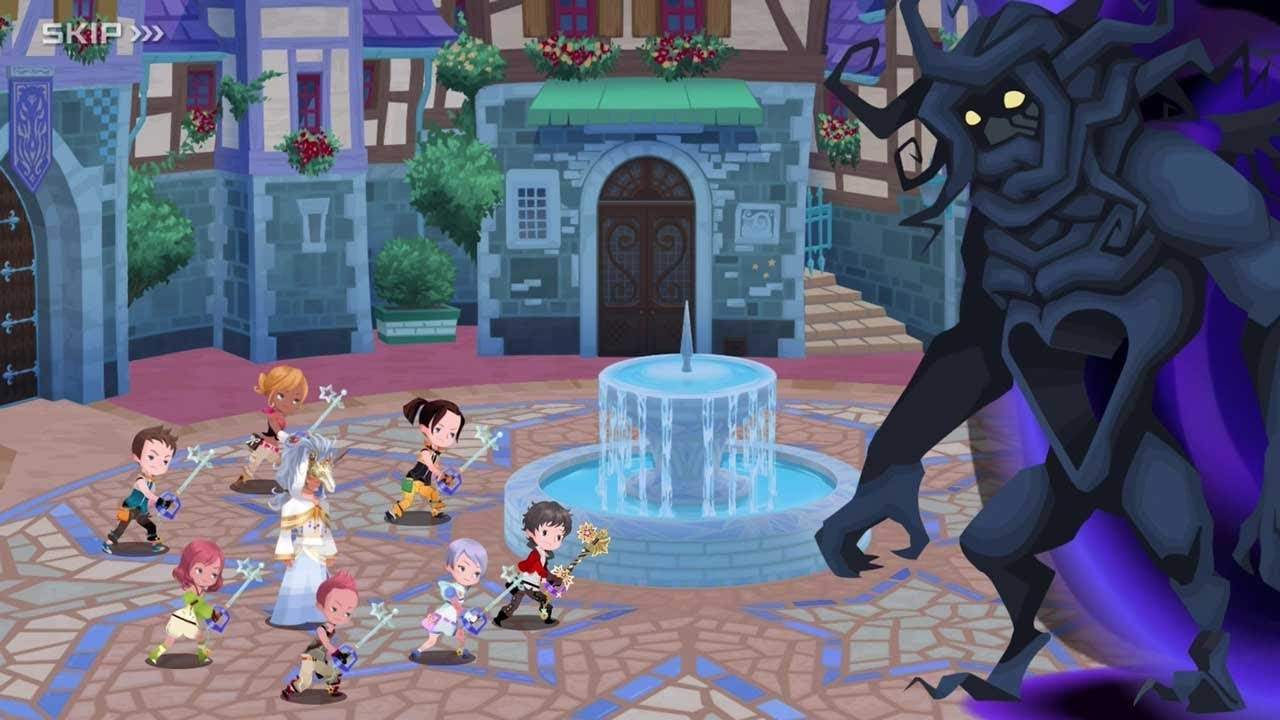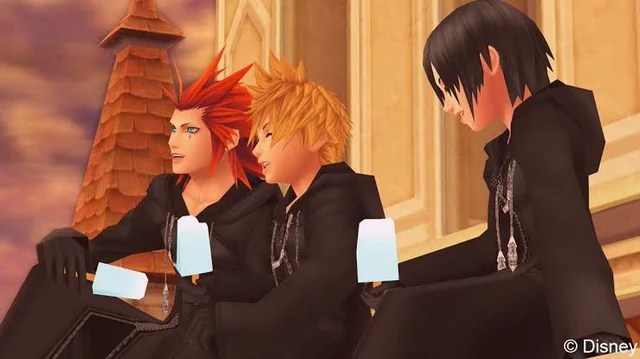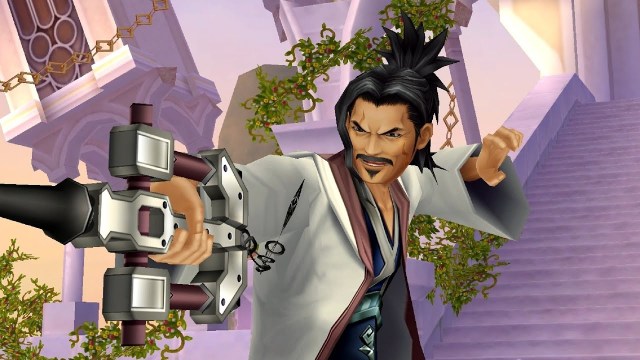Kingdom Hearts is light!
[Please extend a warm welcome to new freelance writer Sorrel Kerr-Jung! Sorrel has previously worked for entertainment sites such as Looper and CBR, as well as writing for their local newspaper, they are now kicking the door down here at Destructoid by tackling the mightiest subject of all: Kingdom Hearts continuity. – Chris Moyse]
It’s tough to talk about Kingdom Hearts without mocking it in all the easiest ways. Yes, the basic idea of a Disney-themed JRPG developed by Square Enix is ridiculous. Yes, it’s hilarious to watch Mickey Mouse look Squall Leonhart in the eye and ask him what he knows about the Door to Darkness. Yes, Goofy has done battle with Sephiroth, yes, Maleficent loves to time travel, and yes, you’d better believe that Donald Duck is canonically stronger than Bahamut. All of these things are true.
But here’s the secret: all of these things are also great. I love Kingdom Hearts for its ardent refusal to go the easy route. It absolutely rules that, when granted the adaptational rights to Disney’s catalog of revered classics, Square Enix chose to invent a world and imbue it with a ridiculous amount of unintelligible lore. Kingdom Hearts could have been a phoned-in, simple (and clean) series of licensed Disney games for kids. Instead, it’s a franchise comprised of some of the best action RPGs ever made. Featuring Tinker Bell. Not every Kingdom Hearts game is created equally, though — and there are a lot of Kingdom Hearts games. So, here’s every Kingdom Hearts game (including the ones that aren’t really games), ranked from worst to best.
Kingdom Hearts χ/Dark Road
Right out the gate, I’m already cheating a little. In some ways, this entry actually covers three games — there’s Kingdom Hearts χ, a browser game that was only ever released in Japan, Kingdom Hearts Union χ, a mobile-exclusive sequel that’s also kind of a remake that was released worldwide a few years later, and Kingdom Hearts Dark Road, a largely separate story that’s accessed from within the Union χ app. To look at things from another perspective, though, this entry also covers zero games.
Kingdom Hearts χ and Union χ are both totally unplayable in 2022, as servers for both titles have been taken offline. The only way to officially experience the story is to trudge through the comically terrible cutscene collection available in the Union χ app, preferably with a guide at the ready since the cutscenes aren’t arranged in any remotely logical order.
It’s a shame given that the χ storyline digs into the Keyblade War, one of the more interesting and important periods in Kingdom Hearts‘ history. Dark Road gets a slight bump for the fact that it’s still technically playable (sans online), but, honestly, the gameplay just barely counts as “gameplay,” and it doesn’t resemble the action RPG combat found in the other games at all. There’s some neat insight into series antagonist Xehanort’s history here, but it’s surrounded by headaches.
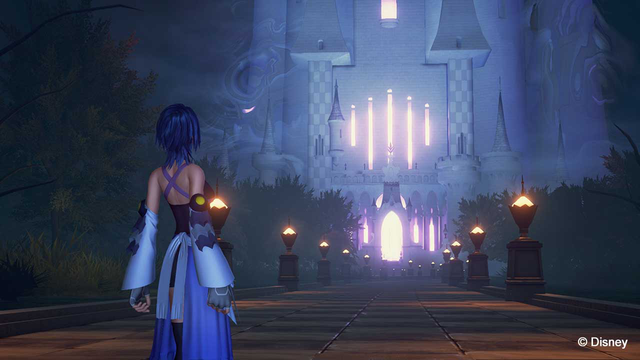
Kingdom Hearts 0.2: Birth By Sleep – A Fragmentary Passage
There’s really not much to say about A Fragmentary Passage. As the title suggests, it’s not a full game; it’s more of a brief prelude to Kingdom Hearts 3. By the time A Fragmentary Passage came out, most of the (many, many) pieces of Kingdom Hearts 3‘s massive puzzle were already in place, so this one doesn’t add too much to the narrative. For the most part, it’s just an excuse to check-in on Aqua, a fan-favorite character from Kingdom Hearts: Birth By Sleep.
A Fragmentary Passage utilizes the excellent combat system found in Kingdom Hearts 3, so it’s naturally pretty pleasant to play. It’s also got a rudimentary character customization system, something Kingdom Hearts isn’t exactly known for. It gives Aqua something to do and fleshes out her character quite handily, but the whole thing is over so quickly that it’s hard to care too much about any of it.
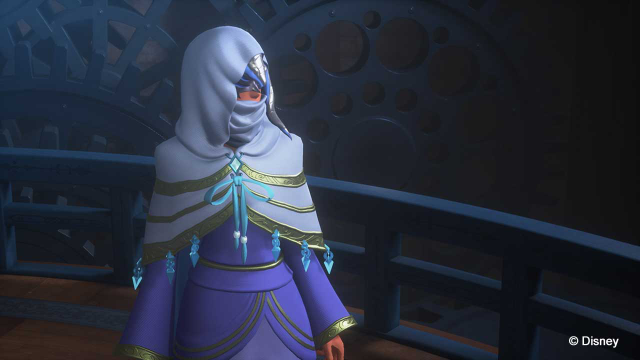
Kingdom Hearts χ Back Cover
Thankfully, the miserable cutscene theater in the Union χ app is not the only way to get a bit of insight into the χ story. Kingdom Hearts χ Back Cover, a one-hour movie that was included in the Kingdom Hearts HD 2.8 Final Chapter Prologue compilation, takes place during the events of the original browser game. It’s not a complete recap of that game’s events, but it is a pretty decent whodunnit mystery that gives some much-needed identity to the Foretellers, a group of string-pulling weirdos central to Kingdom Hearts χ‘s plot.
Back Cover is actually a fairly good time, and it features what might be a career-best performance from Ray Chase as the Master of Masters, the guy who pulls the strings on the string-pullers. Unfortunately, there are a few things that are holding it back from climbing any higher on this particular list. First, of course, is that it isn’t a video game — the only reason I’m including it on this list at all is that it was technically released on a PlayStation 4 disc.
Second is that it was produced while the story of Union χ was still ongoing, so it can’t act as a meaningful substitute for that darn cutscene theater. The most important reason Back Cover is condemned to the far reaches of this ranking, though, is that there’s absolutely no Disney content to be seen here. Later Kingdom Hearts games are often criticized for sidelining Disney characters, but Back Cover excises them entirely. The idea of a Kingdom Hearts mystery is a very fun one, but the movie doesn’t feel very Kingdom Hearts at all.
Kingdom Hearts 358/2 Days
Hear me out here: Kingdom Hearts 358/2 Days is not a great game. This Nintendo DS side story is focused entirely on Roxas, the main playable character for the first several hours of Kingdom Hearts 2. Roxas is the series protagonist Sora’s “Nobody”, a kind of zombie that comes into being when a person becomes a Heartless. If those proper nouns are making your head spin, you haven’t seen anything yet.
358/2 Days is a prequel focused on Roxas’ time with Organization XIII, the antagonistic group that gave Sora a hard time in Kingdom Hearts 2. The game represents a so-so effort at bringing the Kingdom Hearts formula to the DS. While it introduces some formally interesting elements to the series, including a Monster Hunter-ish mission system, moment-to-moment combat is a slog. It’s also got far and away the most convoluted plot of any of these titles — no small feat for a series like this — and it’s a bit difficult to get at all invested in the supposed tragedy of it all.
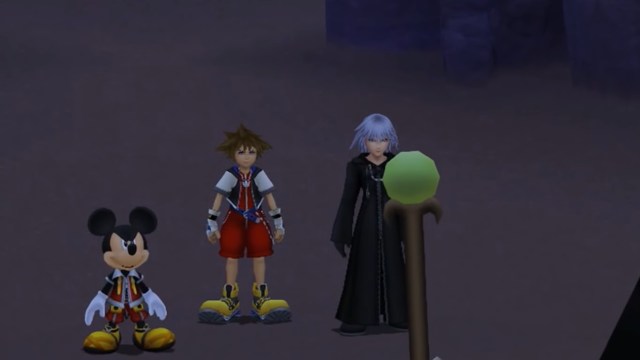
Kingdom Hearts Coded
Coded began life as a mobile game released in episodes, and the story certainly feels like that of an episodic mobile adventure. It’s much smaller than the other epic tales in the Kingdom Hearts series, taking place almost entirely in a parallel data world. Most of this game is a retread of events from previous games, and it’s not always entirely obvious how it factors into the broader saga, but honestly, that miniature scale is a bit refreshing at times.
The best version of Coded is definitely the DS release. It does a much better job of translating Kingdom Hearts to the DS than 358/2 Days, and it’s nice to play a Kingdom Hearts game that both feels good and isn’t all that heady. Like everything else in the series, it’s pretty much nonsensical (the data world exists inside of a paper journal, but everything inside of it is apparently digital, and it’s not entirely clear who is in which world at any moment), but it’s not all that important. Also, come on. Kingdom Hearts in the Matrix is pretty cool.
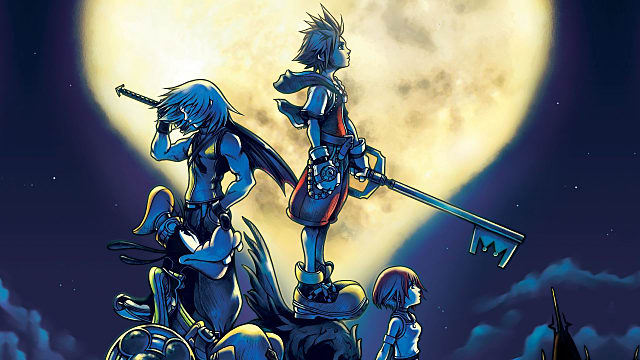
Kingdom Hearts
I know, I know. Keeping the original Kingdom Hearts this far from first place is blasphemous. It’s a classic. It’s the game that started it all. Here’s the thing – Kingdom Hearts should actually be lower on this list. I’m giving it a huge boost based on the importance of blazing a trail. Truth be told, Kingdom Hearts is not a great game. It’s a total rough draft of what the series would eventually become. The foundations are here, but boy, they’re pretty shaky.
Kingdom Hearts is an action game from 2002, and twenty years later, knowing what we know about action game design, it is not fun to go back to. The camera flails about like it’s been taped to the end of a mace during regular combat, and during boss fights, it only gets worse. It also contains the worst version of the worst mini-game in the form of the Gummi Ship. There is, of course, lots to love in the original Kingdom Hearts; it’s still got some of the best Disney worlds in the series, the story is relatively simple for the first and last time, and it introduces the ridiculously imaginative world and lovable characters that define the rest of the series. It’s just… not that good.
Kingdom Hearts Birth By Sleep
Birth By Sleep is a bit of a black sheep in the Kingdom Hearts canon. It features an almost entirely original cast, swapping Sora and co. for a new trio of heroes: Aqua, Terra, and Ventus. Actually, Ventus is kind of Sora, but that’s a story for another time. Aqua and Terra are fledgling Keyblade wielders training under Master Eraqus and Master Xehanort about a decade before the events of the original Kingdom Hearts. This is the game where the lore of Kingdom Hearts became basically incomprehensible, establishing the Keyblade as a lightsaber-style emblem of some ancient group of noble warriors (fittingly, Eraqus is voiced by one Mark Hamill).
All that convoluted lore is supported by a pretty charming central cast of three heroes, each of whom gets their own campaign that feeds into one central narrative. It’s kind of like Kingdom Hearts by way of NieR:Automata, and it’s as odd and compelling as that sounds. Birth By Sleep is also, in some ways, Kingdom Hearts‘ finest “tragedy,” focusing on characters who genuinely fail and suffer in the process. It’s the first game that makes Xehanort a truly compelling villain, and it expands the scope of Kingdom Hearts to a truly exciting degree. Add to that the fact that this one has a Lilo and Stitch world and yeah, it’s pretty good.
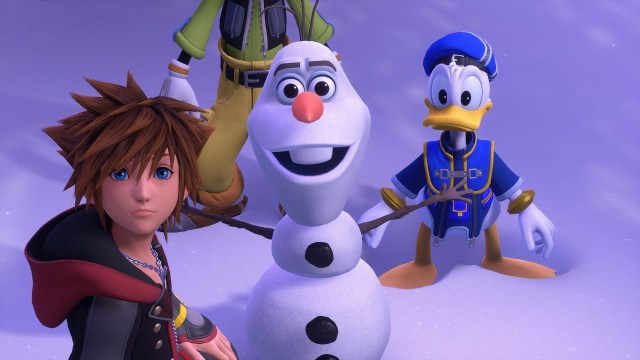
Kingdom Hearts 3
Oh, Kingdom Hearts 3, you lovable mess. This culmination of the franchise’s first major narrative arc almost certainly bit off more than it could chew. It’s the kind of game that always had to be everything for everyone, and it ended up being only one thing for one very specific group of people: a really good game for Kingdom Hearts super fans. As a Kingdom Hearts super fan, I’m here to confirm that, yes, this is a really good game.
Kingdom Hearts 3 doesn’t totally work. It attempts to resolve every major plot line introduced up to that point, and there’s no shortage of major plot lines in Kingdom Hearts. Still, when KH3 works, it works really well. It’s constantly paying off beats established literal decades before, and the game seems so excited about that fact that it’s hard for players to resist being pulled in. It even briefly made me care about Kingdom Hearts χ. The combat utilizes elements of every game in the series, adding a few new pieces of its own to create what is, if not the best, certainly the largest action game combat system ever made, and the story, while disjointed and messy, really does give every major player a chance to shine. It’s messy around the edges and a little too big for its ideas, but it might be the best version of Kingdom Hearts 3 I could have asked for.

Kingdom Hearts: Chain of Memories
Chain of Memories was the game that taught players what to expect out of Kingdom Hearts. At the beginning of Kingdom Hearts 2, Sora is chilling in an egg in somebody’s basement. Why? To get that answer, you need to play the Game Boy Advance spinoff. Lesson learned: no Kingdom Hearts spinoff is skippable, and Chain of Memories might be the least skippable of them all.
Picking up right where the original Kingdom Hearts left off, Chain of Memories follows Sora, Donald, and Goofy as they adventure through Castle Oblivion, slowly losing their memories as they go. A lot of the worlds in this one are reskinned versions of worlds from the first game — handily, Sora doesn’t remember that first game, so most of his dialogue can remain unaltered — but the broader plot is both totally original and deeply compelling. This is where Organization XIII, the Nobodies, and the all-important friendship between Riku and Mickey Mouse were introduced. It’s also got one of my personal favorite Kingdom Hearts mechanics, a charming deckbuilding system that hasn’t returned since. There’s a pretty decent PS2 remake, but for my money, you ought to play this on GBA.
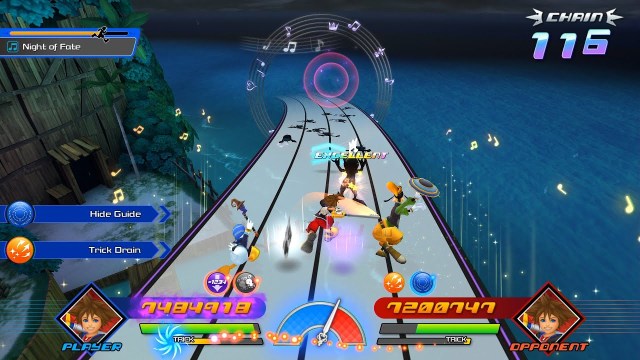
Kingdom Hearts Melody of Memory
One of the best things about Kingdom Hearts is the music. Over the last twenty years, legendary composer Yoko Shimomura has been accompanied by a bevy of brilliant musicians, including Japanese-American pop star Hikaru Utada, and the series has amassed the best collective soundtrack a gaming franchise could ask for. What better way to celebrate all that excellent music than with a rhythm game?
Melody of Memory isn’t really a Kingdom Hearts game in the usual sense. There’s no real combat, not many RPG elements, and barely any ridiculously convoluted lore. It’s mostly just a straightforward rhythm game designed to celebrate the series’ music. Thankfully, the series’ music is ridiculously good. Developed by Theatrhythm Final Fantasy developer indieszero, Melody of Memory really is an excellent rhythm game, and a great excuse to listen to the Traverse Town theme again. And again. And again.
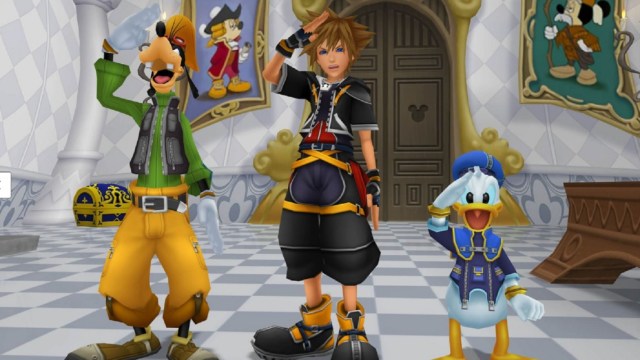
Kingdom Hearts 2
Most people would pretty confidently call Kingdom Hearts 2 the best Kingdom Hearts game. Maybe most people are right! It is a pretty exceptional game. The combat is deep and involved without becoming ridiculously complex, the story is pleasantly silly but still coherent enough for its emotional beats to land, and it remains one of the best-looking PlayStation 2 games ever made.
It’s tough to say anything negative about Kingdom Hearts 2. It strikes the perfect balance between the silly, convoluted mess of JRPG lore that Kingdom Hearts would become and the saccharine, endearing crossover that Kingdom Hearts was always sold as. I don’t think it’s the best Kingdom Hearts game, but there’s a good chance that it is the most perfect.
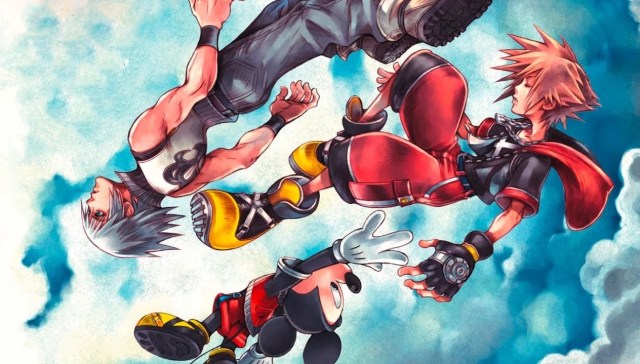
Kingdom Hearts 3D: Dream Drop Distance
This is a weird pick for the top spot, but I promise I can explain. Kingdom Hearts has always been a story about maturing. The very first game is the tale of two boys who have never left home being thrust into the wider world, and being forced to contend with darkness. On one side, there’s Sora, who finds the outside world exciting. On the other side, there’s Riku, who finds his home stifling. They both want to see everything, but one is optimistic, where the other is cynical. Riku contends with that cynicism for the entire game, while Sora thrives with that optimism.
In Dream Drop Distance, Sora and Riku finally find out what kinds of people they’ve become. Sora has followed the arc that was always set for him – he’s gone from JRPG protagonist to cartoon character. In this game, he’s the most cartoonish and lovable he’s ever been. Riku, meanwhile, has grown into something resembling an actual adult. He’s not addicted to the novelty of new experiences the way Sora is, but he also no longer resents his own life the way he used to. He wants to take care of his friends, and he wants to preserve the almost-ordinary world he’s built with them. Sora might be the hero of Kingdom Hearts, but Riku, at long last, is the hero of his own story.
Does it help that Dream Drop Distance has the best combat in any Kingdom Hearts game? Sure. Is it nice that there’s a creature-collecting system featuring some of the cutest guys of all time? Of course. But at the end of the day, Dream Drop Distance is my favorite Kingdom Hearts game because it is the fullest realization of Kingdom Hearts. In its own weird way, Kingdom Hearts is about growing up. In Dream Drop Distance, Kingdom Hearts grows up.

